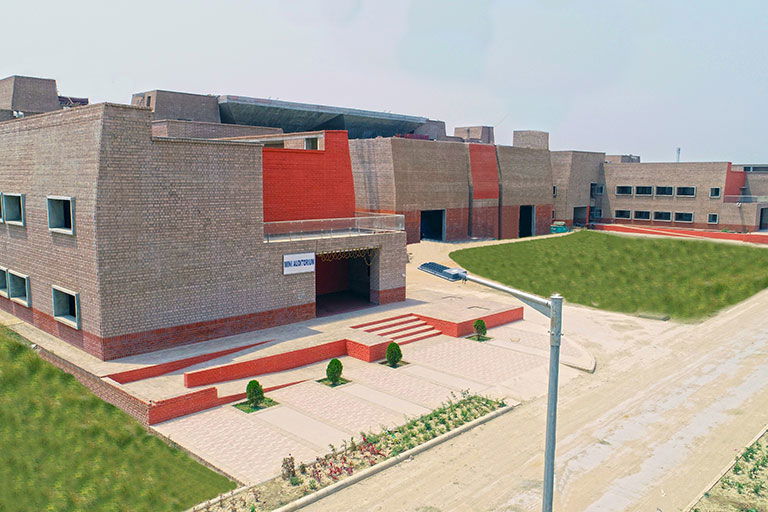The Ph.D. program in Environmental Engineering focuses on diverse approaches to engineering, and candidates are expected to develop close relationships with their cohort, which is composed of students from different backgrounds and ethnicities. In addition to the diversity of the student body, the program emphasizes the use of microorganisms to remediate acid mine damage. In the 2015-2016 academic year, only one doctorate was awarded, and applicants must have a master's degree before they are accepted into the Ph.D. program.
A doctoral degree in environmental engineering is a specialized graduate degree that emphasizes environmental science. Students in these programs will study the science and engineering principles that have an impact on the environment. Ph.D. graduates may work in fields that address new issues pertaining to the environment. These issues include sustainable air, water, and land, sustainable agriculture, and environmental restoration. They will also be prepared for advanced technical work, such as teaching or researching.
While the Ph.D. program may take five years to complete, the coursework is more rigorous and challenging. The doctoral degree aims to master the field of environmental science. As a result, students may specialize in topics such as renewable energy, biofuels, hydrology, and civil infrastructure materials. A Ph.D. degree is also required for employment. There are many advantages to studying environmental engineering at Illinois Tech. The program is located in a great city in New Jersey, which is convenient for those who wish to work in the field.
Ph.D. in Environmental Engineering Eligibility
Candidates who want to take admission in Ph.D. must have a post-graduate degree in Ph.D. in Environmental Engineering and its relevant discipline with at least 55% marks from a recognized university and must have passed the national level entrance examination or university level entrance examination. National level entrance exams like UGC NET / UGC CSIR NET / GATE / SLET or University entrance exams consist of written tests and personal interviews.
The Benefits of a Ph.D. in Environmental Engineering
Graduates from the environmental engineering program will engage in research and practice related to the field. They will be able to synthesize technical knowledge of engineering analysis and design into sustainable solutions for professional problems. They will also perform service to society through professional societies, government and civic organizations, and humanitarian endeavors. The benefits of this program are numerous, and they should not be ignored. This article will briefly explore some of the advantages.
The graduate program in environmental engineering offers students the opportunity to develop an understanding of ecosystems and human systems. The curriculum integrates sustainability principles. Faculty and students collaborate regularly on multi-disciplinary research projects. Some programs focus on developing countries, where students are encouraged to implement appropriate technical and foster social change. The department attracts more than $3 million in funding annually, making it a top-notch choice for students interested in this field.
The program benefits from its established relationships with researchers. In addition, students have the opportunity to publish their research papers in peer-reviewed journals. The environmental engineering department's reputation and long-standing connections with scientists have helped make it a desirable place to study. In 2017, U.S. News & World Report ranked the environmental engineering program as the 9th best graduate program among public schools.
The Career Opportunities of a Ph.D. in Environmental Engineering
There are many career opportunities in environmental engineering. In addition to being a well-rounded professional, a Ph.D. in this field will enable you to lead and direct projects. This position will often include leading projects and managing subordinates. As an added benefit, you will have the opportunity to work closely with management and manage budgets. The hiring market for environmental engineers is expected to grow by 12 percent over the next decade.
The environmental engineering Ph.D. program emphasizes diverse approaches to engineering. The program fosters close relationships between professors and students. The graduate students are diverse in background and ethnicity, and they are also encouraged to pursue their interests. These individuals will be equipped with the credentials and knowledge necessary to develop large-scale solutions to environmental problems and combat climate change. As of 2016, there are currently seven Ph.D. graduates in the program.
Getting a Ph.D. in Environmental Engineering is an excellent way to build your knowledge base and advance your career. There are numerous online programs that offer this program. You may want to explore your options before deciding which one to pursue. If you're interested in learning more, consider a career in environmental engineering that fits your personality. Once you've got your Ph.D., you'll be well-prepared to enter the workforce.
The Future Scope of a Ph.D. in Environmental Engineering
Graduates with a Ph.D. in Environmental Engineering have a broad base of knowledge and a solid foundation in scientific and technical principles. These graduates should have outstanding organizational, mathematical, and presentation skills. Costs of the program vary depending on the length, but in general, the cost of a Ph.D. in Environmental Engineering is around $90,000. To find out how much it will cost, check out various websites and contact schools.
An environmental engineering Ph.D. is an excellent degree to have if you want to work on global environmental problems. The scope of this degree is huge in the field, and it will open many doors. You could become an independent environmental consultant, join a government agency, or start your own environmental NGO. You could also become a researcher at a state, national, or international agency to find ways to improve the environment.
The future scope of a Ph.D. in Environmental Engineering is vast. The study of environmental problems is critical, and a Ph.D. in this field allows you to become an expert in this field. Once you have graduated, you can work for an independent environmental consulting firm or start your own environmental NGO. You may also join a national, or international agency. You can even use your Ph.D. in Environmental Engineering to work on solving environmental problems.
Ph.D. Research Programme duration
The Ph.D. in Environmental Engineering course is a minimum of 3 years and a maximum of 5 years in duration. This depends on the university offering the course.
Fees for research program for Environmental Engineering
The average fee for Ph.D. in Environmental Engineering degree is between INR 50000 and INR 500000.
 5 Years
5 Years
 PhD
PhD
 Research
Research

































 back
back